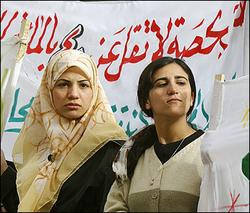 Iran Next:
Iran Next: Here's a very interesting take on the what's happening/may happen in Iran and the reasons behind it..........
Muckracker Report
On November 10th 2005, the Muckraker Report published an article that described one of the unspoken reasons why the United States had to invade Iraq; to liberate the U.S. dollar in Iraq so that Iraqi oil could once again be purchased with the petrodollar. (See The liberation of the U.S. Dollar in Iraq)
In November 2000, Iraq stopped accepting U.S. dollars for their oil. Counted as a purely political move, Saddam Hussein switched the currency required to purchase Iraqi oil to the euro. Selling oil through the U.N. Oil for Food Program, Iraq converted all of its U.S. dollars in its U.N. account to the euro. Shortly thereafter, Iraq converted $10 billion in their U.N. reserve fund to the euro. By the end of 2000, Iraq had abandoned the U.S. dollar completely.
Two months after the United States invaded Iraq, the Oil for Food Program was ended, the country's accounts were switch back to dollars, and oil began to be sold once again for U.S. dollars. No longer could the world buy oil from Iraq with the euro. Universal global dollar supremacy was restored.
It is interesting to note that the latest recession that the United States endured began and ended within the same timeframe as when Iraq was trading oil for euros. Whether this is a coincidence or related, the American people may never know.
In March 2006, Iran will take Iraq's switch to the petroeuro to new heights by launching a third oil exchange. The Iranians have developed a petroeuro system for oil trade, which when enacted, will once again threaten U.S. dollar supremacy far greater than Iraq's euro conversion.
Called the Iran Oil Bourse, an exchange that only accepts the euro for oil sales would mean that the entire world could begin purchasing oil from any oil-producing nation with euros instead of dollars. The Iranian plan isn't limited to purchasing one oil-producing country's oil with euros. Their plan will create a global alternative to the U.S. dollar. Come March 2006, the Iran Oil Bourse will further the momentum of OPEC to create an alternate currency for oil purchases worldwide. China, Russia, and the European Union are evaluating the Iranian plan to exchange oil for euros, and giving the plan serious consideration.
If you are skeptical regarding the meaning of oil being purchased with euros versus dollars, and the devastating impact it will have on the economy of the United States, consider the historic move by the Federal Reserve to begin hiding information pertaining to the U.S. dollar money supply, starting in March 2006. Since 1913, the year the abomination known as the Federal Reserve came to power, the supply of U.S. dollars was measured and publicly revealed through an index referred to as M-3. M-3 has been the main stable of money supply measurement and transparent disclosure since the Fed was founded back in 1913. According to Robert McHugh, in his report (What's the Fed up to with the money supply?), McHugh writes, "On November 10, 2005, shortly after appointing Bernanke to replace Greenbackspan, the Fed mysteriously announced with little comment and no palatable justification that they will hide M-3 effective March 2006."
Is it mere coincidence that the Fed will begin hiding M-3 the same month that Iran will launch its Iran Oil Bourse, or is there a direct threat to the stability of the U.S. dollar, the U.S. economy, and the U.S. standard of living? Are Americans being set up for a collapse in our economy that will make the Great Depression of the 1930's look like a bounced check? If you cannot or will not make the value and stability of the U.S. currency of personal importance, if you are unwilling to demand from your elected officials, an immediate abolishment of the Federal Reserve Act of 1913 and the fiat money scheme that the banking cartel has used for nearly a century now to keep our government and our people in a state of perpetual debt, than you are faced with but two alternatives, abject poverty, or invading Iran.
The plans to invade Iran are unspoken, but unfolding before our very eyes. The media has been reporting on Iran more often, and increasingly harshly. For the U.S. government to justify invading Iran, it must first begin to phase out the War in Iraq, which it is already doing. Next, it must portray the Iranian President, Mahmoud Ahmadinejad, as a threat to the region and the world. Finally, once naive American people are convinced the "weapons of mass destruction" that were to be found in Iraq are actually in Iran, coupled with the almost daily media coverage of Iran's nuclear power / weapons program aspirations, and what we will soon have on our hands is another fabricated war that will result in tens of thousands of civilian lives being lost, all because the political elected pawns in Washington DC lack the discipline to return our currency to a gold or silver standard, end the relationship with the foreign banking cartel called the Federal Reserve, and limit the activities of the U.S. government to those articulated in Article I Section 8 of the Constitution for the United States of America.
When a wayward and corrupt fiscal policy and fiat currency, coupled with runaway government spending, forces a nation to only be able to sustain the value of its currency with bullets, the citizenry of the country involved in wars primarily to sustain its currency have historically first became slaves to their government, and then to the nations that finally conquer them. If you question the validity of such a premise, or whether it could happen to the United States of America, study the fall of the Roman Empire. If you read the right books on the subject, you'll quickly discover that towards the end of the Roman reign, the Roman Empire was doing exactly what America is doing today; attempting to sustain a failed fiat money system with bullets.
Understanding fiat money is not an easy task, and the Federal Reserve, World Bank, and International Monetary Fund have purposely made it that way. They do not want the American people to realize that the money in their wallet loses its value with each new dollar that they print. They do not want people to understand that our money does not become money until it is borrowed. When the Federal Reserve has money printed, when it is in uncut sheets of paper, it is not yet money. After it is cut, bundled, and placed into the Federal Reserve vaults, it still is not money. It only becomes money once it is borrowed. Consequently, if all debt were to be paid, if the United States didn't have an $8 trillion national debt and the American people were debt free, and if all loans of U.S. dollars made to foreigners were paid in full, there would be exactly zero U.S. dollars in circulation because it will have all been returned to the vaults of the Federal Reserve. This might seem hard to fathom, but it is the gospel of fiat money.
The major news media in the United States, fed by Washington DC which in turn is fed by the Federal Reserve, literally, has already begun conditioning the American people for invading Iran. Media accounts of Iran's nuclear ambitions along with amplification of the potential instability and core evilness of Iran's president, Mahmoud Ahmadinejad, is setting the stage to spring the invasion of Iran on the American people. There does appear to be a direct correlation between the winding down effort underway in Iraq and the increase of anti-Iran rhetoric. How American soldiers ultimately arrive in Tehran is uncertain at this time, but it is reasonable to expect that if the Iran Oil Bourse opens for business in March 2006 as planned, it will only be a matter of time before the United States will have to blow it up.
If the United States invades Iran, or if Israel starts military actions by launches missiles at Iran's nuclear power facilities, which then opens the door for the United States to intervene, most Americans will believe that our military actions in Iran will be to defend freedom and liberty while spreading democracy, when the truth is that we'll be fighting a war in Iran because of our nation's relationship with the Federal Reserve, a so-called bank that is not owned by the federal government, maintains no reserve, and isn't a bank at all, but a cartel. Just like our war in Iraq, Americans and foreigners will die in battle so that the historical power bankers and brokers; cartel members such as Rothschild, Morgan, Lehman, Lizard, Schrader, Lobe, Kuhn, and Rockefeller to name a few, can continue collecting interest on every single U.S. coin and dollar bill in circulation, while controlling the U.S. Congress to the extent that the U.S. taxpayer becomes the collateral and lender of last resort to cover bad loans and unpaid debts that these institutions create by loaning money to third world countries, some of which are devout enemies of the United States. Remember the $400 billion savings & loan bailout approved by the U.S. Congress during the Reagan Administration? America is still paying for it - you and me, and so will our children and grandchildren.
It is well overdue for Americans, every American, to do whatever it takes to fully understand the relationship between the United States and the Federal Reserve, along with the grave consequences of our current fiat money system; for even if the United States wanted to continue to sustain the supremacy of the U.S. dollar with bullets, it is historically, impossible. When bullets become the commodity to secure a currency, it is a clear sign of devastating calamity looming. To ignore the warning signs, is to suffer like you have never suffered before, or to die. Harsh words, but true.
 : If CNN or Al Jazeera are your only source of global information, good luck and enjoy your daily fixes. But only if you are not happy with their new coverage, then may be you should try Democracy Now! This is a national, daily, independent, award-winning news program airing on over 400 stations in North America. Pioneering the largest public media collaboration in the U.S., Democracy Now! is broadcast on Pacifica, NPR, community, and college radio stations; on public access, PBS, satellite television (DISH network: Free Speech TV ch. 9415 and Link TV ch. 9410; DIRECTV: Link TV ch. 375); as a "podcast," and on the internet. The program is hosted by award-winning journalists Amy Goodman and Juan Gonzalez and produced out of the Downtown Community Television Center, a community media center in New York City’s Chinatown (shown to the right). Democracy Now!'s War and Peace Report provides our audience with access to people and perspectives rarely heard in the U.S.corporate-sponsored media, including independent and international journalists, ordinary people from around the world who are directly affected by U.S. foreign policy, grassroots leaders and peace activists, artists, academics and independent analysts. In addition, the War and Peace Report hosts real debates - debates between people who substantially disagree, such as between the White House or the Pentagon spokespeople on the one hand, and grassroots activists on the other. New stations are adding Democracy Now! to their programming schedules all the time, and there are several movements going on around the country right now to bring Democracy Now! to new communities.
: If CNN or Al Jazeera are your only source of global information, good luck and enjoy your daily fixes. But only if you are not happy with their new coverage, then may be you should try Democracy Now! This is a national, daily, independent, award-winning news program airing on over 400 stations in North America. Pioneering the largest public media collaboration in the U.S., Democracy Now! is broadcast on Pacifica, NPR, community, and college radio stations; on public access, PBS, satellite television (DISH network: Free Speech TV ch. 9415 and Link TV ch. 9410; DIRECTV: Link TV ch. 375); as a "podcast," and on the internet. The program is hosted by award-winning journalists Amy Goodman and Juan Gonzalez and produced out of the Downtown Community Television Center, a community media center in New York City’s Chinatown (shown to the right). Democracy Now!'s War and Peace Report provides our audience with access to people and perspectives rarely heard in the U.S.corporate-sponsored media, including independent and international journalists, ordinary people from around the world who are directly affected by U.S. foreign policy, grassroots leaders and peace activists, artists, academics and independent analysts. In addition, the War and Peace Report hosts real debates - debates between people who substantially disagree, such as between the White House or the Pentagon spokespeople on the one hand, and grassroots activists on the other. New stations are adding Democracy Now! to their programming schedules all the time, and there are several movements going on around the country right now to bring Democracy Now! to new communities.






 Denmark My Love: I went to Denmark for the first time in 1983. This was my first foreign trip outside my native Bangladesh. I did fall in love with Denmark right way.
Denmark My Love: I went to Denmark for the first time in 1983. This was my first foreign trip outside my native Bangladesh. I did fall in love with Denmark right way.





